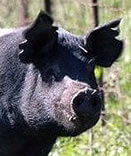Ear-mark
What's the meaning of the word 'Ear-mark'?
To set aside for a particular purpose.
What's the origin of the word 'Ear-mark'?
There ought to be no room on a site dedicated to the meaning and origins of phrase for a single word like ear-mark. It justifies inclusion here because of its origin as two separate words - ear mark. When seeing it as two words, it isn't difficult to guess that the source of the phrase was the marking of ears, and that guess would be correct.
 In these days, in western countries at least, most farm animal's ears are fitted with metal tags, which include details of the animal's ownership, date of birth etc. Before the 1950s, when ear tags became commonplace, the ownership of stock like pigs and sheep was denoted by the clipping of the ears. This formed a permanent record and was an alternative to branding.
In these days, in western countries at least, most farm animal's ears are fitted with metal tags, which include details of the animal's ownership, date of birth etc. Before the 1950s, when ear tags became commonplace, the ownership of stock like pigs and sheep was denoted by the clipping of the ears. This formed a permanent record and was an alternative to branding.
The practice is old and dates back in the UK to at least the 16th century. Edmund Spenser referred to it then in print in Prosopopoia Or Mother Hubberds Tale, 1591:
Least we like rogues should be reputed
for eare marked beasts abroad be bruted.
The figurative use that we are familiar with today didn't begin until the late 19th century, no doubt because the literal usage was still in everyday usage. An early example of the metaphorical use, that is, one where no actual ear was involved, is recorded in The Spectator, June 1890:
With large sums ear-marked and accumulating for the extinction of licences.

